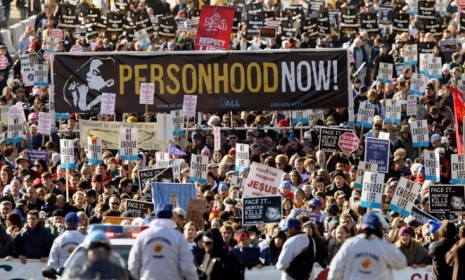Mississippi's failed 'personhood' amendment: 3 takeaways
A proposal to define a fertilized human egg as a person was expected to pass in Mississippi, and radically alter the abortion debate. Why didn't it?

A free daily email with the biggest news stories of the day – and the best features from TheWeek.com
You are now subscribed
Your newsletter sign-up was successful
One of the biggest surprises of this week's off-year elections was the failure of Mississippi's controversial 'personhood' amendment, which would have defined a fertilized human egg as a person. Polls suggested the measure would pass easily in the strongly anti-abortion state. Instead, it lost 57 percent to 43 percent. What happened? Here, three lessons:
1. The anti-abortion movement is split
The "personhood" amendment would have passed if it had been a clear-cut matter of abortion rights advocates vs. anti-abortion activists, says Lauren Markoe of Religion News Service. But some anti-abortion groups, Christian leaders, and doctors opposed the amendment because of its potential to prohibit cancer treatment for pregnant women, block in vitro fertilization, ban common types of birth control and lead to other unintended consequences. Even outgoing Gov. Haley Barbour, who supported the amendment, expressed doubts. Anti-abortion advocates learned a lesson, says Thomas Peters at CatholicVote.org. "When we are absolutely unified and engaged, we can win. When we are not, we suffer setbacks."
The Week
Escape your echo chamber. Get the facts behind the news, plus analysis from multiple perspectives.

Sign up for The Week's Free Newsletters
From our morning news briefing to a weekly Good News Newsletter, get the best of The Week delivered directly to your inbox.
From our morning news briefing to a weekly Good News Newsletter, get the best of The Week delivered directly to your inbox.
2. You can't always trust polls
Sometimes, people tell pollsters what they think they're supposed to say, not what they really believe, says Amanda Marcotte at Slate. In conservative Mississippi, "the religious Right has so much social control" that many people reflexively said they'd support "personhood." But left to decide for themselves in the voting booth, many citizens obviously changed their minds, and the holdout "undecideds" voted no, en masse.
3. The conservative surge is over
"Somebody needs to break the news to the Republican candidates looking to unseat President Barack Obama," says the Baltimore Sun in an editorial, "that the conservative tide that swept the nation in 2010 has receded." A short while back, when Republicans were riding high, right-wing activists might have gotten away with this. But "calling for strict limits on the reproductive rights of women won't necessarily play well in 2012."
A free daily email with the biggest news stories of the day – and the best features from TheWeek.com
-
 How the FCC’s ‘equal time’ rule works
How the FCC’s ‘equal time’ rule worksIn the Spotlight The law is at the heart of the Colbert-CBS conflict
-
 What is the endgame in the DHS shutdown?
What is the endgame in the DHS shutdown?Today’s Big Question Democrats want to rein in ICE’s immigration crackdown
-
 ‘Poor time management isn’t just an inconvenience’
‘Poor time management isn’t just an inconvenience’Instant Opinion Opinion, comment and editorials of the day
-
 The billionaires’ wealth tax: a catastrophe for California?
The billionaires’ wealth tax: a catastrophe for California?Talking Point Peter Thiel and Larry Page preparing to change state residency
-
 Bari Weiss’ ‘60 Minutes’ scandal is about more than one report
Bari Weiss’ ‘60 Minutes’ scandal is about more than one reportIN THE SPOTLIGHT By blocking an approved segment on a controversial prison holding US deportees in El Salvador, the editor-in-chief of CBS News has become the main story
-
 Has Zohran Mamdani shown the Democrats how to win again?
Has Zohran Mamdani shown the Democrats how to win again?Today’s Big Question New York City mayoral election touted as victory for left-wing populists but moderate centrist wins elsewhere present more complex path for Democratic Party
-
 Millions turn out for anti-Trump ‘No Kings’ rallies
Millions turn out for anti-Trump ‘No Kings’ ralliesSpeed Read An estimated 7 million people participated, 2 million more than at the first ‘No Kings’ protest in June
-
 Ghislaine Maxwell: angling for a Trump pardon
Ghislaine Maxwell: angling for a Trump pardonTalking Point Convicted sex trafficker's testimony could shed new light on president's links to Jeffrey Epstein
-
 The last words and final moments of 40 presidents
The last words and final moments of 40 presidentsThe Explainer Some are eloquent quotes worthy of the holders of the highest office in the nation, and others... aren't
-
 The JFK files: the truth at last?
The JFK files: the truth at last?In The Spotlight More than 64,000 previously classified documents relating the 1963 assassination of John F. Kennedy have been released by the Trump administration
-
 'Seriously, not literally': how should the world take Donald Trump?
'Seriously, not literally': how should the world take Donald Trump?Today's big question White House rhetoric and reality look likely to become increasingly blurred